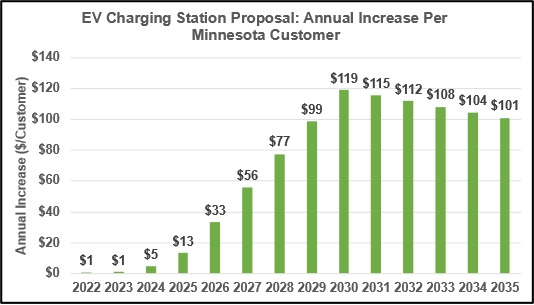Energy omnibus bill could increase electricity costs by $2.6 billion for electric vehicle charging stations
Lawmakers in St. Paul are busy scheming new ways to spend the state’s $17 billion surplus and finding new ways to raise your taxes, to boot. Sadly, liberal lawmakers are also seeking to enact policies that would increase your electric bills by forcing you to pay for electric vehicle (EV) charging stations.
House File 413 would allow electric companies to increase the cost of electricity for everyone to pay for EV charging stations. As a result, it is basically a blank check to Xcel Energy.
Xcel is already trying to spend $300 million on a controversial plan to build 730 electric vehicle fast charging stations and a pilot program for electric school buses that would be paid through raising electricity prices. Hundreds of comments opposing this plan have been filed at the PUC, and it is unclear if the Commission will approve this plan.
However, $300 million is a small fraction of the money that would be spent to build enough charging stations to accomplish the Walz administration’s EV goals. In PUC filings, Xcel Energy filings at the Public Utilities Commission state that the 730 fast-charging EV stations will only be enough to meet 18 percent of Minnesota’s charging needs by 2030. The company states that meeting the state’s 2030 EV charging needs would cost $1.6 billion.
American Experiment determined that spending $1.6 billion on EV charging infrastructure would ultimately cost Minnesota families and businesses an additional $2.6 billion through 2035, with the program’s annual costs starting small and peaking at $119 per customer in 2030.

This includes an additional $753 million in corporate profits for utility companies, assuming a 52-48 equity-debt split with an assumed rate of return of 10.2 percent for equity and 4.8 percent for the debt. It also assumes an additional $198 million in additional property tax payments over thirteen years.
These costs will be even higher considering that experts expect that these charging facilities will only operate for ten years before needing replacement.
This means that the energy omnibus could rubber stamp billions of additional costs for Minnesota electricity customers for infrastructure that will only last for ten years. These costs will be foisted on all Minnesotans, even low-income Minnesotans who cannot afford an EV. As a result, this bill is a wealth transfer from working families to wealthy ones.